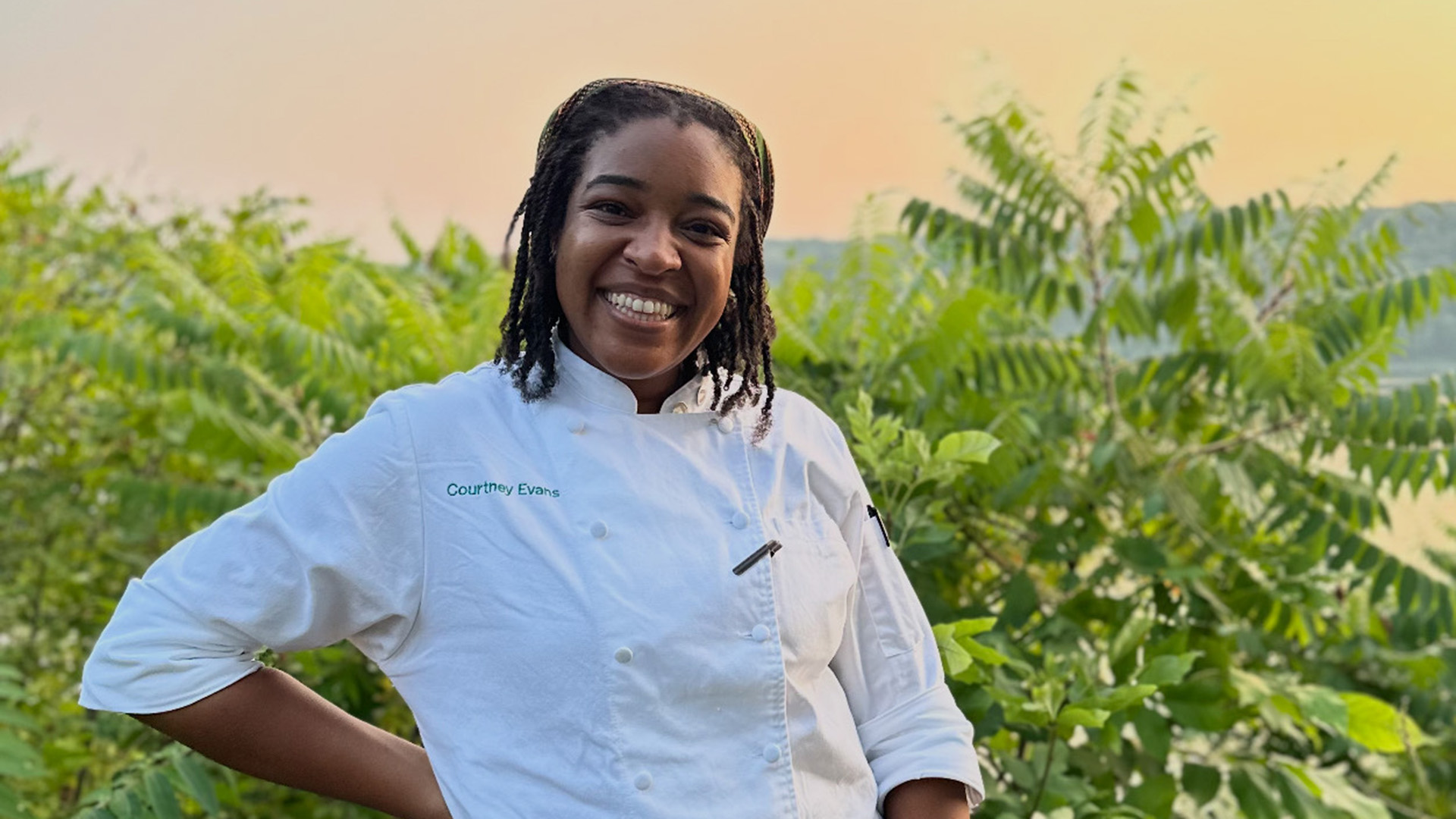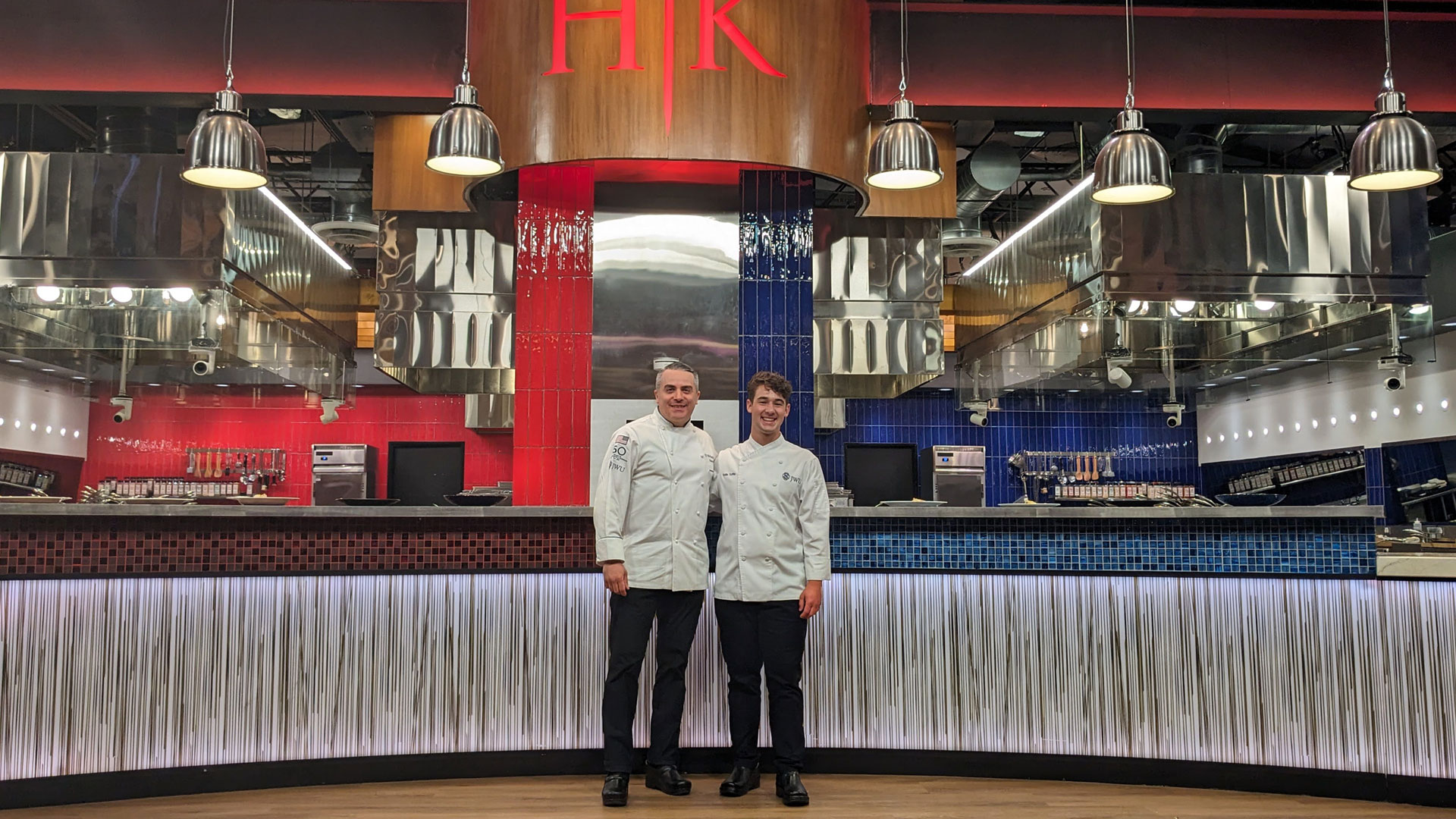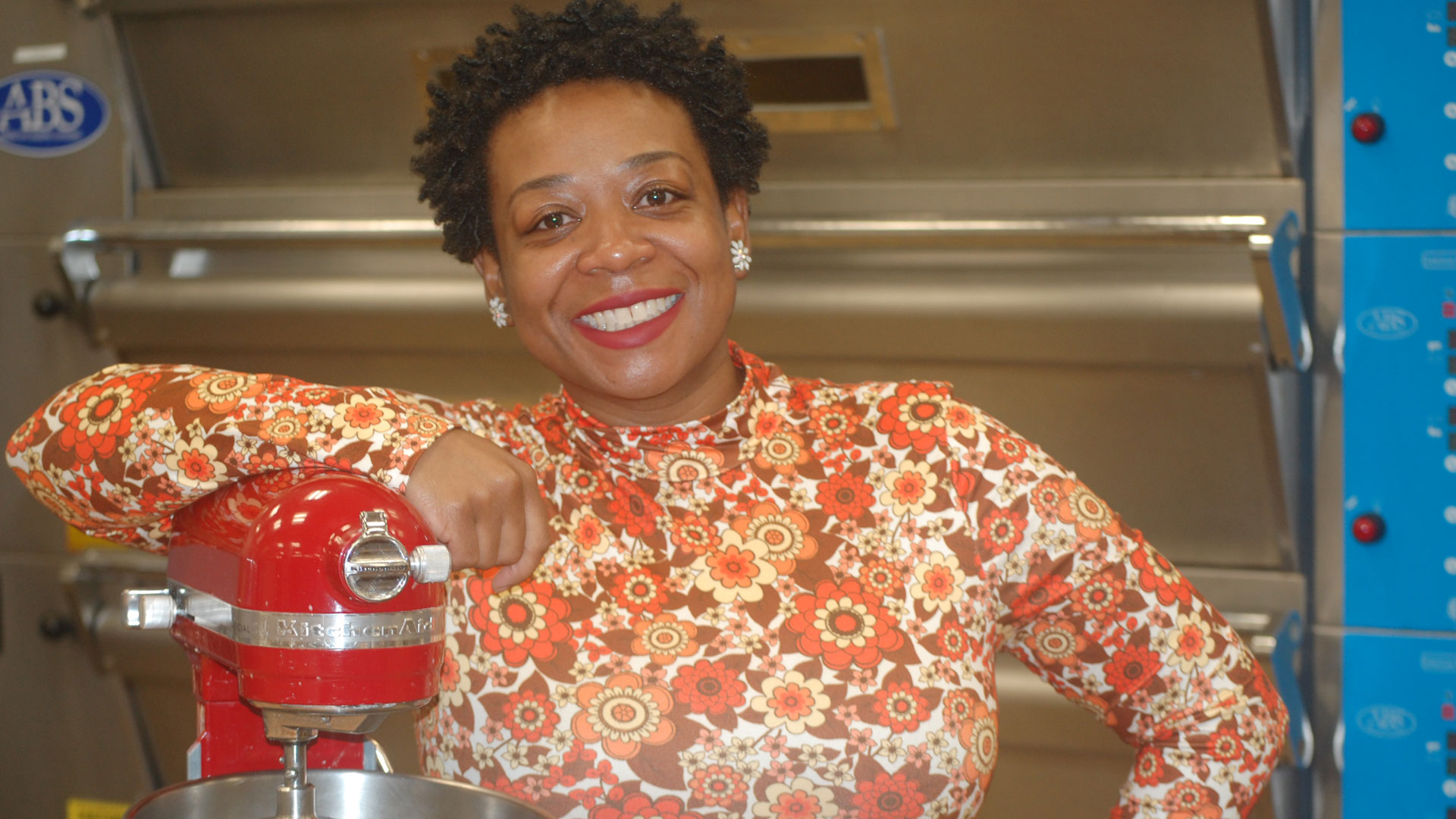JWU Alumna Builds Community Through Growing Food
“While other kids were watching Disney Channel, I was glued to the cooking channel,” says Mariah Henry ’19. “I remember setting alarms for the episodes I wanted to catch so I could write out recipes and try them out. Those notebooks are still with me today.”
Like many Johnson & Wales University College of Food Innovation & Technology students, she credits family for giving her the confidence and curiosity to explore food as a child. “My great-aunt Tootie always kept both a thriving backyard garden and a plot at a community garden,” she shares. “She was the one who first put a seed in my hand. At the same time, my cousin Sandy (who I refer to as Aunt Sandy) was the cook who carried our family traditions and soul through food, especially during the holidays. She taught me how to build flavor and the importance of quality ingredients. Techniques like braising, stewing and infusing were instilled in me long before I knew the French terms for them. What I later perfected at Johnson & Wales, I had already experienced in the kitchens of her and my great-grandmother Less, who made the simplest meals full of soul and love. My Aunt Tootie planted seeds in me that later bloomed into a meaningful and authentic career path.”
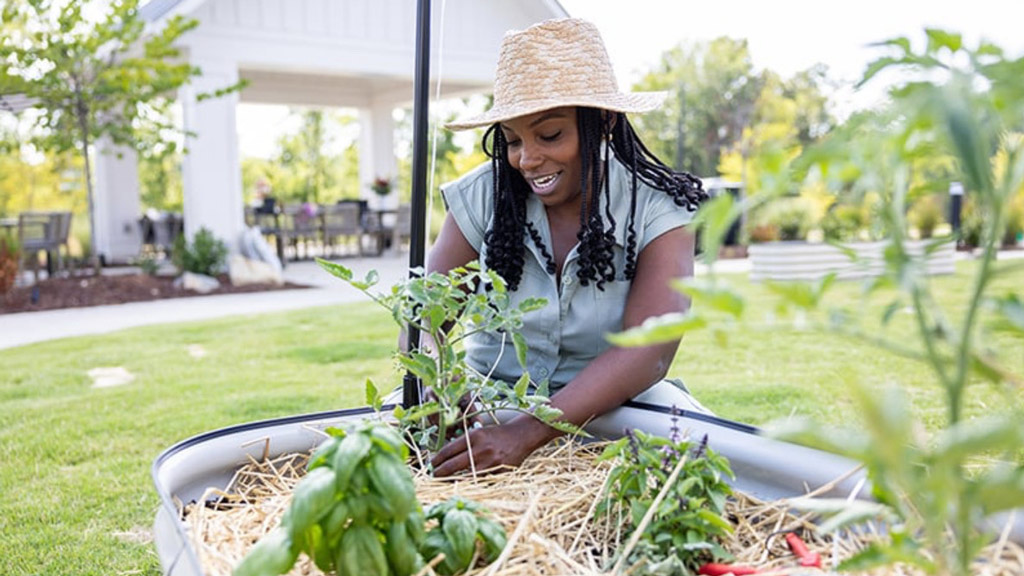
Those seeds never stopped growing. After earning her bachelor’s degree at a university in Florida, Henry began a promising career linked to her passion for growing food — but realized she could be doing even more.
“I wanted a deeper, more meaningful connection to food,” shares Henry. “At the time, I was living in Omaha, Nebraska, working as a program manager for No More Empty Pots (NMEP), a nonprofit where I oversaw a community garden and other programs. NMEP had a commissary kitchen with programs for entrepreneurship and culinary arts certificates. Day after day I envisioned myself on the other side. I already had experience in the agriculture space, but I wanted to merge that with a formal culinary training.”
Why Choose JWU for a Food System Education?
Henry’s research on culinary schools brought her to a familiar space. “I rediscovered Charlotte, a place I’d lived in during high school and had always wanted to return to,” she says. “Learning that Johnson & Wales had a campus there felt like a door opening. In my research, it felt like a calling for food creatives of all kinds to move to Charlotte. I took a huge leap of faith, quit my job and put all my plans on hold to attend Johnson & Wales.”
She finished her associate degree in Culinary Arts in just three terms and at the top of her class, while still being involved with her church garden club. “Since I already had a bachelor’s [degree] I was among the few ‘older’ students in class,” she shares. “It humbled me and gave me a focus I didn't have in my undergrad experience.”
She soon merged her passion and JWU culinary education. When she became director of urban agriculture at Carolina Farm Trust, Henry was on a mission to re-educate, reform and lead communities into economic resiliency through food. She has bridged gaps to ensure consistent access to quality meals and local foods while identifying inequalities with BIPOC and minority farmers. Through regenerative and climate smart practices, she prepared emerging agricultural leaders and curated a pipeline of sustainable food production to consumption.
How JWU Contributed to Henry’s Journey
“My instructors at Johnson & Wales knew my background and encouraged my curiosity about ingredients, sourcing and food waste,” Henry states. “What I loved about the program is that every resource was available: the equipment, the faculty support and the willingness to order specific products so we could experiment! I was especially interested in learning how to elevate dishes with food scraps, incorporating every part of the plant into our food system from an institutional point of view.”
She names several JWU community members who played a role in her journey, including Chef Ashley McGee, Chef Daina Soto-Sellers and Henry’s entire nutrition class. “It was incredible to have culinary leaders nurture my interest in sustainable food systems,” she says. “The environment was illuminating. It wasn’t just about technique; it was about expanding the way I thought about food from the field to the kitchen. My experiences with students and faculty continue to shape the way I approach food and sustainability today.”
Hands-on Experience Growing Food
“I knew I had a connection to the process, but not the knowledge to cultivate it successfully,” says Henry, recalling how her great-aunt Tootie would hand her various seeds to sow. “When I finally began growing for myself (as an adult), it was humbling. I would buy plants, put them in the ground, and struggle with basics like spacing, watering and pruning. I wasn’t getting a harvest, and it reminded me that growing food is something you grow into; it takes patience, study, time and faith.”
Experiential education is the foundation of a JWU education. Although Henry’s bachelor’s degree taught her about soil science and lab work, she had to gain real-world knowledge to fully understand how to grow food. “I eventually learned through volunteering, community classes, online workshops, job roles, books and a full season of a farm apprenticeship at Wild Hope Farm,” she states. “After my farmer apprenticeship I felt confident to not only cultivate crops but to start a farm, and that's exactly what I did.”
Being Empowered by Growing Food
“To see myself now, managing acres of land, planting hundreds of feet of diverse crops, and harvesting everything from lettuce to blueberries to carrots, okra and flowers is a full-circle moment,” shares Henry. “Carrots remain one of my favorites to grow, while okra has taught me the importance of timing.”
It’s not just food that she loves to cultivate. “I have the sweetest love affair with growing flowers, and they have taught me to appreciate the present moment — for they will wither away, too,” she states. “Those early mistakes weren’t failures; they were lessons that shaped the grower I am today. And I don’t take any of it for granted.”
Supporting Communities through Food
Henry credits her recent work at Carolina Farm Trust with teaching her the importance of connection, intention and authenticity in her work supporting local farmers and boosting community connection to food. “The best way for communities outside the Carolinas to strengthen farm networks is by starting with what is around you,” she advises. “Easy and exciting opportunities like visiting your local farmers market will get you in front of your local farmers and producers. Ask questions, support them on a continuous basis and support them with your dollars and time. Every time you visit, bring someone else and share their product; it will cost you nothing but opens the door for others to engage in their local food system.”
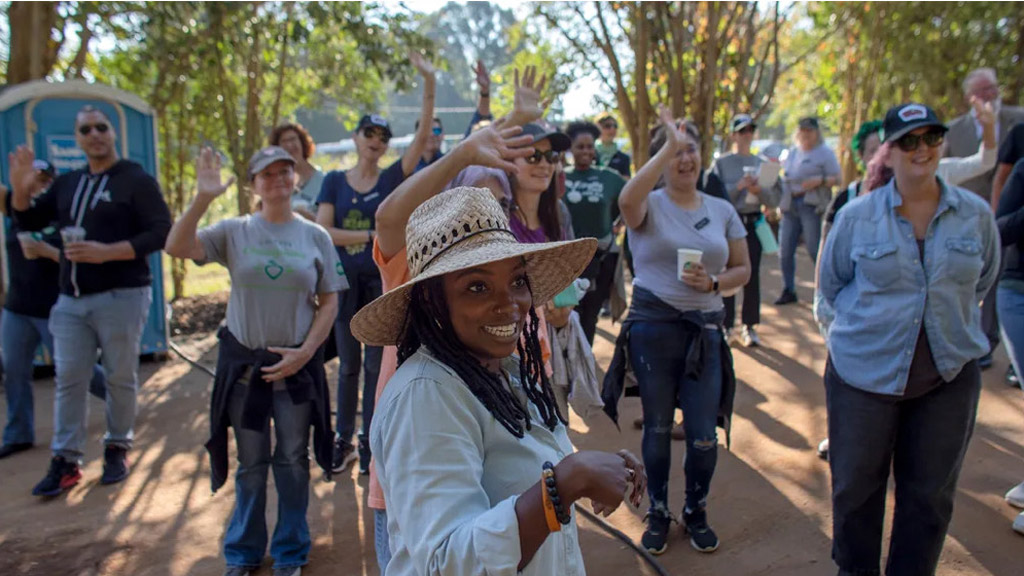
“Building resilient food communities is not the responsibility of the producer alone; we need consumers, community advocates, organizations and institutions who are committed to making changes even when it goes against profits,” shares Henry, “Engaging at a community level is an undervalued action — and it speaks volumes! Connect with city officials and understand what policies are in place and what resources are available for our food insecure neighbors. We can't always see hunger, but it is closer than you think.”
Her advice: “Take a look at your community. Where is the closest grocery store, farm or access to fresh food? Do you live in an area that's flooded with fast-food restaurants? Is there anyone in your community who is teaching about nutrition, gardening, preserving food cultures and traditions? Lastly and most importantly, do your neighbors have access to foods that are culturally appropriate? We are all accountable for each other, and we all have different needs. Food justice goes beyond equality and equitable food access.”
Encouraging Others to Grow Food
Henry has made local news for encouraging neighbors at The Stead, the apartment complex in Charlotte where she recently lived, to grow their own food. “My time at The Stead was a tremendous opportunity, and I am proud of the community that was cultivated,” she notes. “I knew residents were excited about the garden, but I didn't know how it would impact individual homes. One day while I was working in the garden a young girl approached me and began asking questions about the garden, and naturally I was ready to share my knowledge. To my surprise, she could identify the plants and said that she harvested carrots from our garden and made a delicious salad. It was rewarding and humbling to see how access to fresh foods changed how folks were eating.”
She continues, “One of my goals was for residents to visit the garden before the grocery store. My time at The Stead was more than an amenity to the residents; they were making lifestyle changes. I would come home and see patios with plants that we started in our workshops, and neighbors reaching out for extra pints of my holy basil ice cream! Those moments I miss most. The Stead allowed me to showcase what I believed in: a life well lived by using everything around you. I recently visited the garden, and it was thriving with seasonal crops and the perennial herbs I planted; the community garden didn't die when I left. [That’s] the best impact you could hope for.”
Leading Change in Growing Food
Henry has spent much of her career alongside others serving communities, organizations and the hospitality industry, and now she will merge her agricultural legacy with her culinary creativity: “This next season I have decided to lead that charge. My road has been far from straight, and I continue to encourage others to sow seeds of faith until they are rooted in their own soil.”
She has founded her own company, Honey & Maple, designed to provide culinary ideation, local sourcing, event execution, green space design and community engagement to the Charlotte, North Carolina area. “I founded Honey & Maple as more than a creative home; it’s where my passion for food, advocacy, farming and design come together,” states Henry. “Through it, I’m working with chefs, farmers, community leaders and cultural influencers to strengthen our food system and create space for other leaders. I’m collaborating with nonprofits, corporations and residential communities to bring food and agriculture amenities and wellness experiences like what I helped launch at The Stead to those ready to take a stand in reclaiming our food system.”
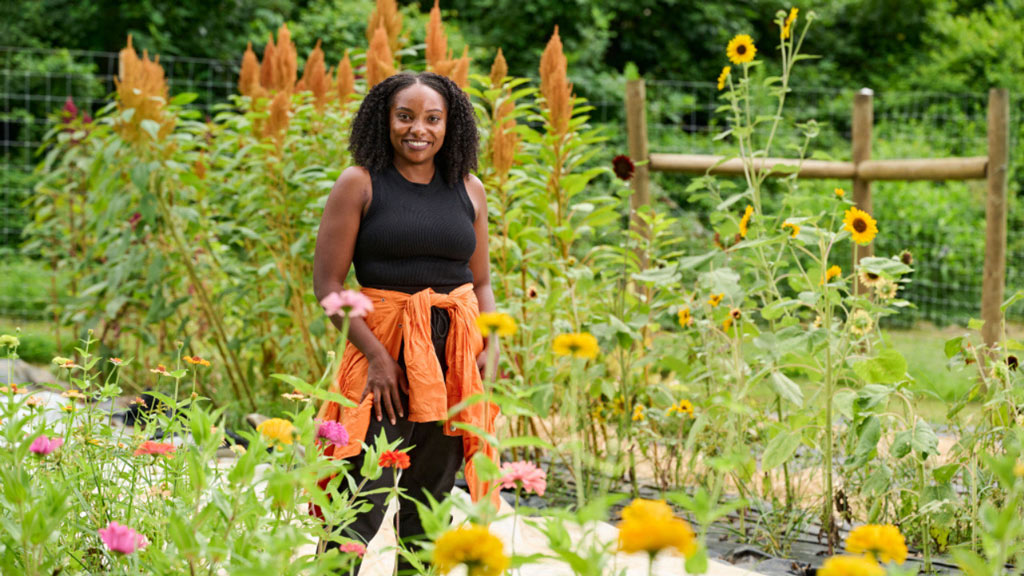
“Looking forward, I’m excited about a new venture that brings me back to one of my first loves,” she adds. “Even more special, I get to build it alongside my mother. It’s a full-circle moment that feels like the natural extension of the roots I’ve been planting all along.”
How to Get Involved in Growing Food
Follow MariahHenry.com for instructions and tips on growing food or flowers and to learn about upcoming events. Even if you don’t live in the Carolinas, she welcomes engagement via her contact page from all who want to be involved in the food-growing movement.
“There is a role for everyone; you don't have to be the farmer in the field,” she says. “I like to tell others who feel that they can't grow, ‘seeds want to grow’ — so if you find yourself near me, you will grow!”
